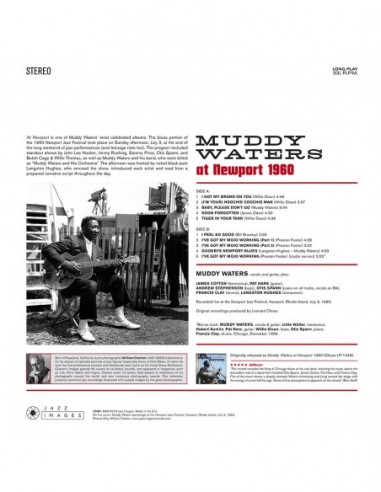At Newport 1960 (Gatefold Cover)
Muddy WatersTHE WILLIAM CLAXTON COLLECTION
180 pure virgin vinyl LPs in Gatefold packaging
4 STARS ALL MUSIC GUIDE
PERSONNEL:
MUDDY WATERS, vocals, and guitar, plus:
JAMES COTTON (harmonica)
PAT HARE (guitar)
ANDREW STEPHENSON (bass,
OTIS SPANN (piano on all tracks, vocals on B4),
FRANCIS CLAY (drums),
LANGSTON HUGHES (announcer).
Recorded live at the Newport Jazz Festival, Newport, Rhode Island, July 3, 1960.
(*) Bonus track:
Muddy Waters (voc, g); Little Walter (hca);
Hubert Sumlin, Pat Hare (g); Willie Dixon (b);
Otis Spann (p); Francis Clay (d).
Chicago, December 1956.
SIDE A:
1 I GOT MY BRAND ON YOU
2 (I’M YOUR) HOOCHIE COOCHIE MAN
3 BABY, PLEASE DON’T GO
4 SOON FORGOTTEN
5 TIGER IN YOUR TANK
SIDE B:
1 I FEEL SO GOOD
2 I’VE GOT MY MOJO WORKING (Part 1)
3 I’VE GOT MY MOJO WORKING (Part 2)
4 GOODBYE NEWPORT BLUES
5 I’VE GOT MY MOJO WORKING [studio version] (*)
(*) BONUS TRACK
- Format
- LP
- Discs
- 1
- Label code
- 37081
 Cookie preferences
Cookie preferences























































